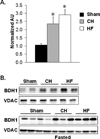The Failing Heart Relies on Ketone Bodies as a Fuel
- PMID: 26819376
- PMCID: PMC4766035
- DOI: 10.1161/CIRCULATIONAHA.115.017355
The Failing Heart Relies on Ketone Bodies as a Fuel
Erratum in
-
Correction to: The Failing Heart Relies on Ketone Bodies as a Fuel.Circulation. 2018 Oct 9;138(15):e422. doi: 10.1161/CIR.0000000000000621. Circulation. 2018. PMID: 30354520 No abstract available.
Abstract
Background: Significant evidence indicates that the failing heart is energy starved. During the development of heart failure, the capacity of the heart to utilize fatty acids, the chief fuel, is diminished. Identification of alternate pathways for myocardial fuel oxidation could unveil novel strategies to treat heart failure.
Methods and results: Quantitative mitochondrial proteomics was used to identify energy metabolic derangements that occur during the development of cardiac hypertrophy and heart failure in well-defined mouse models. As expected, the amounts of proteins involved in fatty acid utilization were downregulated in myocardial samples from the failing heart. Conversely, expression of β-hydroxybutyrate dehydrogenase 1, a key enzyme in the ketone oxidation pathway, was increased in the heart failure samples. Studies of relative oxidation in an isolated heart preparation using ex vivo nuclear magnetic resonance combined with targeted quantitative myocardial metabolomic profiling using mass spectrometry revealed that the hypertrophied and failing heart shifts to oxidizing ketone bodies as a fuel source in the context of reduced capacity to oxidize fatty acids. Distinct myocardial metabolomic signatures of ketone oxidation were identified.
Conclusions: These results indicate that the hypertrophied and failing heart shifts to ketone bodies as a significant fuel source for oxidative ATP production. Specific metabolite biosignatures of in vivo cardiac ketone utilization were identified. Future studies aimed at determining whether this fuel shift is adaptive or maladaptive could unveil new therapeutic strategies for heart failure.
Keywords: fatty acids; heart failure; hypertrophy; metabolism; molecular biology.
© 2016 American Heart Association, Inc.
Figures





Comment in
-
Ketones Step to the Plate: A Game Changer for Metabolic Remodeling in Heart Failure?Circulation. 2016 Feb 23;133(8):689-91. doi: 10.1161/CIRCULATIONAHA.116.021230. Epub 2016 Jan 27. Circulation. 2016. PMID: 26819375 Free PMC article. No abstract available.
-
Heart failure: Ketone bodies as fuel in heart failure.Nat Rev Cardiol. 2016 Mar;13(3):122-3. doi: 10.1038/nrcardio.2016.22. Epub 2016 Feb 11. Nat Rev Cardiol. 2016. PMID: 26864914 No abstract available.
References
-
- Bing RJ. The metabolism of the heart. Harvey Lect. 1954;50:27–70. - PubMed
-
- Bing RJ, Siegel A, Ungar I, Gilbert M. Metabolism of the human heart. II. Studies on fat ketone and amino acid metabolism. Am J Med. 1954;16:504–515. - PubMed
-
- Lopaschuk GD, Belke DD, Gamble J, Itoi T, Schonekess BO. Regulation of fatty acid oxidation in the mammalian heart in health and disease. Biochim Biophys Acta. 1994;1213:263–276. - PubMed
-
- van der Vusse GJ, van Bilsen M, Glatz JF. Cardiac fatty acid uptake and transport in health and disease. Cardiovasc Res. 2000;45:279–293. - PubMed
Publication types
MeSH terms
Substances
Grants and funding
LinkOut - more resources
Full Text Sources
Other Literature Sources
Medical
Molecular Biology Databases
Research Materials

